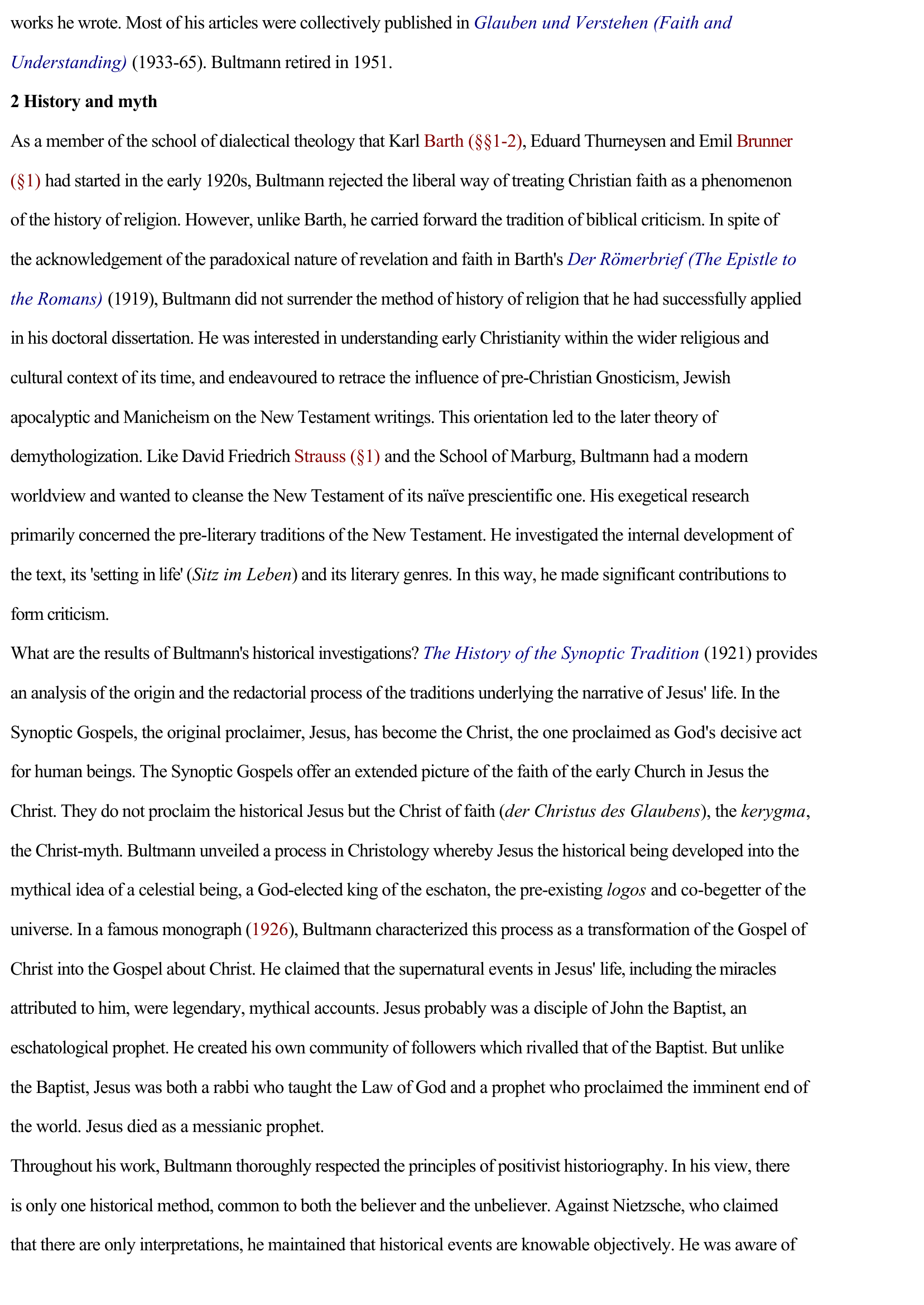Bultmann, Rudolf ?
Publié le 22/02/2012

Extrait du document
«
works he wrote.
Most of his articles were collectively published in Glauben und Verstehen (Faith and
Understanding) (1933-65).
Bultmann retired in 1951.
2 History and myth
As a member of the school of dialectical theology that Karl Barth (§§1-2) , Eduard Thurneysen and Emil Brunner
(§1) had started in the early 1920s, Bultmann rejected the liberal way of treating Christian faith as a phenomenon
of the history of religion.
However, unlike Barth, he carried forward the tradition of biblical criticism.
In spite of
the acknowledgement of the paradoxical nature of revelation and faith in Barth's Der Römerbrief (The Epistle to
the Romans) (1919), Bultmann did not surrender the method of history of religion that he had successfully applied
in his doctoral dissertation.
He was interested in understanding early Christianity within the wider religious and
cultural context of its time, and endeavoured to retrace the influence of pre-Christian Gnosticism, Jewish
apocalyptic and Manicheism on the New Testament writings.
This orientation led to the later theory of
demythologization.
Like David Friedrich Strauss (§1) and the School of Marburg, Bultmann had a modern
worldview and wanted to cleanse the New Testament of its naïve prescientific one.
His exegetical research
primarily concerned the pre-literary traditions of the New Testament.
He investigated the internal development of
the text, its 'setting in life' (Sitz im Leben ) and its literary genres.
In this way, he made significant contributions to
form criticism.
What are the results of Bultmann's historical investigations? The History of the Synoptic Tradition (1921) provides
an analysis of the origin and the redactorial process of the traditions underlying the narrative of Jesus' life.
In the
Synoptic Gospels, the original proclaimer, Jesus, has become the Christ, the one proclaimed as God's decisive act
for human beings.
The Synoptic Gospels offer an extended picture of the faith of the early Church in Jesus the
Christ.
They do not proclaim the historical Jesus but the Christ of faith ( der Christus des Glaubens ), the kerygma ,
the Christ-myth.
Bultmann unveiled a process in Christology whereby Jesus the historical being developed into the
mythical idea of a celestial being, a God-elected king of the eschaton, the pre-existing logos and co-begetter of the
universe.
In a famous monograph ( 1926 ), Bultmann characterized this process as a transformation of the Gospel of
Christ into the Gospel about Christ.
He claimed that the supernatural events in Jesus' life, including the miracles
attributed to him, were legendary, mythical accounts.
Jesus probably was a disciple of John the Baptist, an
eschatological prophet.
He created his own community of followers which rivalled that of the Baptist.
But unlike
the Baptist, Jesus was both a rabbi who taught the Law of God and a prophet who proclaimed the imminent end of
the world.
Jesus died as a messianic prophet.
Throughout his work, Bultmann thoroughly respected the principles of positivist historiography.
In his view, there
is only one historical method, common to both the believer and the unbeliever.
Against Nietzsche, who claimed
that there are only interpretations, he maintained that historical events are knowable objectively.
He was aware of.
»
↓↓↓ APERÇU DU DOCUMENT ↓↓↓
Liens utiles
- NOUVEAU TESTAMENT ET MYTHOLOGIE Rudolf Bultmann (Résumé et analyse)
- INTERPRÉTATION DU NOUVEAU TESTAMENT (L’) [Mythologie des neuen Testaments]. Rudolf Bultmann
- Bultmann, Rudolf Bultmann, Rudolf (1884-1976), exégète et théologien luthérien allemand qui fonda la méthode de l'histoire des formes, destinée à faire apparaître le message des Évangiles grâce à une lecture critique de leur langage.
- Bultmann (Rudolf Karl) Théologien protestant allemand (Wiefelstede, près d'Oldenburg, 1884 - Marburg, 1976).
- Bultmann (Rudolf)

































